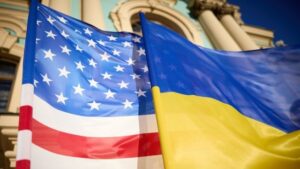
As part of preparations for the next, 20th package of sanctions against Russia, the European Commission has proposed a complete ban on cryptocurrency transactions related to Russia in order to block channels for circumventing restrictions through digital assets, the Financial Times reported, citing an internal European Commission document.
According to the publication, the idea is to move from targeted measures against individual Russian crypto platforms to a broader approach—banning interaction with crypto services linked to Russia. The document also mentions initiatives to restrict transactions related to the digital ruble and measures against certain payment instruments that, according to Brussels, could be used to circumvent sanctions.
Earlier, European Commission President Ursula von der Leyen, presenting the parameters of the new package, announced her intention to tighten restrictions in the financial sector and take measures against cryptocurrencies and platforms that could be used to circumvent the sanctions regime. Reuters also reported that the package includes additional measures against crypto companies that help Russia circumvent restrictions.
The European Commission’s proposals must be unanimously agreed upon by EU member states. EU countries planned to begin discussing the new sanctions package in the coming days, with a target date of February 23.

Indian oil refineries have begun to avoid new purchases of Russian oil for delivery in March-April amid talks between New Delhi and Washington on a trade agreement, which the parties hope to finalize by March, Reuters reports, citing traders and industry sources.
According to the agency, Indian Oil, Bharat Petroleum, and Reliance Industries are not accepting offers for Russian oil with shipments in March and April, although some refineries still have previously agreed deliveries for March. Reuters notes that most other refiners have also stopped new purchases from Russia.
At the same time, as Reuters emphasized earlier, Indian refineries have not received official instructions to stop importing Russian oil and, in the event of a policy change, would require a transition period to complete deals that are already in progress.
The context is the move by the US and India towards an interim trade agreement and the expectation of finalization in March. Against this backdrop, according to Reuters, the US has eased tariff pressure on India, and the American side has publicly linked this to New Delhi’s commitment to reduce purchases of Russian oil.
INDIA, OIL, refineries, RUSSIA

Non-resident investments in Bulgarian real estate in January-November 2025 resulted in a net outflow of €18.6 million, while Russia recorded a net outflow of €19.9 million, according to data from the Bulgarian National Bank (BNB).
According to BNB data, a year earlier (January-November 2024), the net outflow of non-resident investments in real estate was estimated at €11.6 million.
The net outflow indicator means that non-residents’ payments under real estate agreements in the country during the period under review were lower than receipts, i.e., sales exceeded purchases in value terms. At the same time, the fact that the total indicator for all non-residents (-€18.6 million) was less than the outflow for the Russian Federation (-€19.9 million) formally indicates a small aggregate net inflow of investment in real estate from other countries (about €1.3 million).
The BNB report, which is referenced by the media, does not provide a separate breakdown by other countries (including Ukraine) in terms of non-resident investment in real estate—only Russia is highlighted separately.

Noble Capital RSD LLC has filed a lawsuit in the US District Court for the District of Columbia against the Russian Federation, the Russian Ministry of Finance, the Bank of Russia, and the Russian National Wealth Fund, demanding recognition of obligations on sovereign bonds of the Russian Empire placed with investors in the US and recovery of at least $225.8 billion from the defendants. The court documents are available here: https://ia800707.us.archive.org/35/items/gov.uscourts.dcd.281398/gov.uscourts.dcd.281398.1.0.pdf
According to the text of the complaint, the plaintiff is asking the court to issue a declaratory judgment on the principal debt and interest (adjusted for gold), as well as to recognize the possibility of “setting off” of this amount against “blocked sovereign assets of the Russian Federation” in accounts at financial institutions where such assets may be located. Claims for interim measures have also been filed – a ban on the transfer or “mobilization” of blocked assets and the appointment of an equitable receiver for the purposes of recovery.
The case materials indicate that the defendants were notified of the lawsuit on October 1, 2025, and the court granted the Russian side an extension to respond to the lawsuit until January 29, 2026.
This approach (set-off through a private law dispute) can be seen as an attempt to shift the discussion of frozen assets from the realm of political confiscation to the realm of civil law mechanisms.
After February 24, 2022, some countries froze significant amounts of Russian sovereign assets. The European Union froze €210 billion, with Euroclear holding approximately €193 billion of these funds.
https://ia800707.us.archive.org/35/items/gov.uscourts.dcd.281398/gov.uscourts.dcd.281398.1.0.pdf
Noble Capital RSD LLC is a private company in the form of an LLC registered in the state of Delaware (USA). In court documents, it is described as the assignee and legal owner of a block of “sovereign bonds” placed in the US during the Russian Empire.

The Cabinet of Ministers has extended the ban on imports of goods originating from Russia into the customs territory of Ukraine until December 31, 2026.
According to Resolution No. 1707 of December 24, the government amended Cabinet Resolution No. 1147 of December 30, 2015, which is updated annually.
In addition, by Resolution No. 1706, the government extended the term of Resolution No. 1146 of December 30, 2015, which establishes import duty rates on goods originating in the Russian Federation, for another year, until December 31, 2026. These instruments have been in effect since 2015 as countermeasures in response to economic pressure that has been going on for many years.
As reported, in 2015, the Cabinet of Ministers adopted two resolutions restricting trade with Russia in response to the actions of the aggressor state against Ukraine, in particular, the unilateral termination by the Russian Federation of the Agreement on the Free Trade Area within the CIS with regard to Ukraine and the introduction of bans on the import of a number of goods of Ukrainian origin from January 1, 2016. The validity of these acts is extended every year in December.

The US has proposed a meeting between the national security advisors (NSA) of Ukraine, the US, and Russia, Ukrainian President Volodymyr Zelenskyy said, expressing cautious optimism about the prospects for such a meeting.
“As for Umerov (Secretary of the National Security and Defense Council Rustem Umerov, who is in the US, where he held talks with American and European partners on ending the war), he called me and said that America is now proposing a trilateral meeting of the NSA – America, Ukraine, Russia,” Zelensky said in comments to reporters on Saturday.
The president noted that he is not sure that this meeting will bring anything new, but pointed out that a similar meeting in Turkey resulted in the return of captured military personnel and civilians, so it is worth holding such meetings.
“I believe that this is not everything we wanted, but it is very important. I am very glad that we had exchanges. Our people, our military personnel, especially prisoners, have returned home. And civilians too. And that is why such steps must be taken. And if there can now be a meeting that will unblock the exchanges, or if the result of the trilateral NSA meeting could be an agreement on a trilateral meeting of leaders, and I have said this many times, there are complex issues that must be resolved by the leaders of the states. Therefore, if the results are exchanges or some other agreements, I cannot be against it, we will then support the proposal of the United States of America. Let’s see how it goes,” Zelensky said.